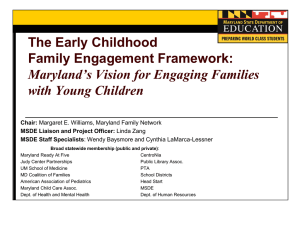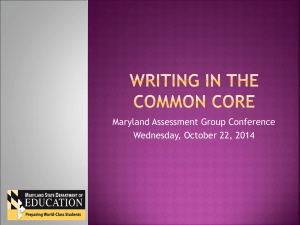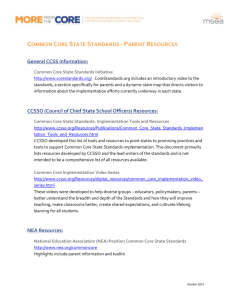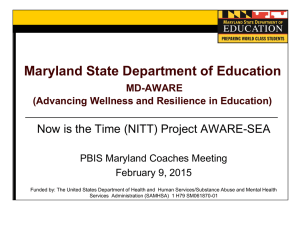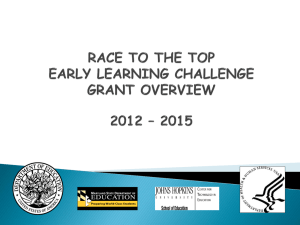Board Briefs - Maryland State Education Association
advertisement
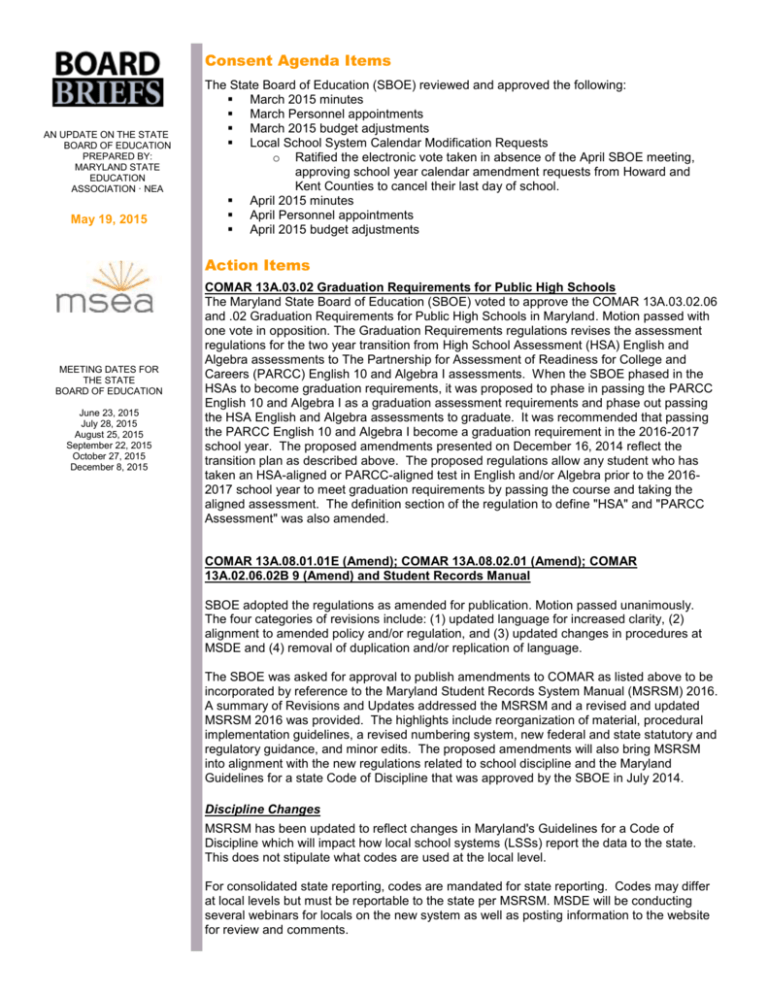
Consent Agenda Items AN UPDATE ON THE STATE BOARD OF EDUCATION PREPARED BY: MARYLAND STATE EDUCATION ASSOCIATION · NEA May 19, 2015 The State Board of Education (SBOE) reviewed and approved the following: March 2015 minutes March Personnel appointments March 2015 budget adjustments Local School System Calendar Modification Requests o Ratified the electronic vote taken in absence of the April SBOE meeting, approving school year calendar amendment requests from Howard and Kent Counties to cancel their last day of school. April 2015 minutes April Personnel appointments April 2015 budget adjustments Action Items MEETING DATES FOR THE STATE BOARD OF EDUCATION June 23, 2015 July 28, 2015 August 25, 2015 September 22, 2015 October 27, 2015 December 8, 2015 COMAR 13A.03.02 Graduation Requirements for Public High Schools The Maryland State Board of Education (SBOE) voted to approve the COMAR 13A.03.02.06 and .02 Graduation Requirements for Public High Schools in Maryland. Motion passed with one vote in opposition. The Graduation Requirements regulations revises the assessment regulations for the two year transition from High School Assessment (HSA) English and Algebra assessments to The Partnership for Assessment of Readiness for College and Careers (PARCC) English 10 and Algebra I assessments. When the SBOE phased in the HSAs to become graduation requirements, it was proposed to phase in passing the PARCC English 10 and Algebra I as a graduation assessment requirements and phase out passing the HSA English and Algebra assessments to graduate. It was recommended that passing the PARCC English 10 and Algebra I become a graduation requirement in the 2016-2017 school year. The proposed amendments presented on December 16, 2014 reflect the transition plan as described above. The proposed regulations allow any student who has taken an HSA-aligned or PARCC-aligned test in English and/or Algebra prior to the 20162017 school year to meet graduation requirements by passing the course and taking the aligned assessment. The definition section of the regulation to define "HSA" and "PARCC Assessment" was also amended. COMAR 13A.08.01.01E (Amend); COMAR 13A.08.02.01 (Amend); COMAR 13A.02.06.02B 9 (Amend) and Student Records Manual SBOE adopted the regulations as amended for publication. Motion passed unanimously. The four categories of revisions include: (1) updated language for increased clarity, (2) alignment to amended policy and/or regulation, and (3) updated changes in procedures at MSDE and (4) removal of duplication and/or replication of language. The SBOE was asked for approval to publish amendments to COMAR as listed above to be incorporated by reference to the Maryland Student Records System Manual (MSRSM) 2016. A summary of Revisions and Updates addressed the MSRSM and a revised and updated MSRSM 2016 was provided. The highlights include reorganization of material, procedural implementation guidelines, a revised numbering system, new federal and state statutory and regulatory guidance, and minor edits. The proposed amendments will also bring MSRSM into alignment with the new regulations related to school discipline and the Maryland Guidelines for a state Code of Discipline that was approved by the SBOE in July 2014. Discipline Changes MSRSM has been updated to reflect changes in Maryland's Guidelines for a Code of Discipline which will impact how local school systems (LSSs) report the data to the state. This does not stipulate what codes are used at the local level. For consolidated state reporting, codes are mandated for state reporting. Codes may differ at local levels but must be reportable to the state per MSRSM. MSDE will be conducting several webinars for locals on the new system as well as posting information to the website for review and comments. Dr. Chester E. Finn, Jr., new SBOE member, commented that the discipline coding still uses only male and female coding exclusively. Response: Ms. Kristina Kyles, MSDE staff, said MSDE is focused on guidance support at this time but is working on the issue. Dr. Finn inquired how they get Hispanic data if Latino/Hispanic is not a category. Response: MSDE is following federal guidelines regarding how the race can be selected. There are seven distinct categories based on this one question; when data is disaggregated this becomes more apparent. Therefore, MSDE gathers more specific data than just Hispanic coding. Dr. Finn also asked what placement for PARCC scores meant. Response: Dr. Henry Johnson, assistant superintendent Division of Curriculum, Assessment, and Accountability, explained it refers to the score the student achieved on the PARCC test. Mr. Larry Giammo, SBOE member, said there are reasons for the reporting of race as we all can appreciate that there are students who have various and sometimes difficult, home life situations. Next Steps: MSDE will have an annual review process and assemble a committee to review and create procedures for the collection of arrest data for collection in 2015-16 school year. Information & Discussion Early Childhood Update SBOE heard a progress report on the Race to the Top Early Learning Challenge Grant, as well as a report on the baseline results from Maryland’s new Kindergarten Readiness Assessment (KRA) from Mr. Rolf Graftwallner, MSDE staff. The new assessment succeeded the Maryland Model for School Readiness (MMSR) assessment program that the state used for more than a decade. Highlights of the Early Learning Challenge Grant Report Some major milestones through December 2014 include: o Surpassed the number of programs participating in Maryland EXCELS during the first 18 months with the exception of the number of public kindergarten programs. o Completed the first statewide administration of the KRA and development work on the formative assessment (Early Learning Assessment). o Full scale field tests on the Preschool STEM project has been initiated in 50 classrooms. Highlights of the Kindergarten Readiness Assessment Report This report establishes a new baseline statewide, by subgroups, and for each of Maryland's 24 local jurisdictions. Based on the new higher standards, the new baseline results for this first year are: Maryland’s new KRA findings are that nearly half (47 percent) of Maryland’s incoming students in the fall of 2014 were fully ready for learning. o MSEA Board Briefs Students demonstrated that they possess the foundational skills and behaviors that prepare them for the curriculum that is based on Maryland's new more rigorous kindergarten standards. 54 percent of females are demonstrating readiness compared to 40 percent of the males. More than half of Asian kindergartners (53 percent), white kindergartners (57 percent), and kindergartners reporting two or more races (52 percent) are demonstrating this new level of readiness. Kindergartners with disabilities, those learning the English language and those from low-income households, have fewer students demonstrating readiness from Maryland kindergartners as a whole. Children who attended care centers (57 percent) and non-public nursery schools (68 percent) the year prior to entering kindergarten exceed the statewide readiness average. Page - 2 (5/19/15) 57 percent of children from middle- and upper income families are ready for kindergarten. The data also provided information on kindergarten readiness based on Pre-K experience, including: o Higher rates for success if student attended Pre-K program; nearly 46 percent of public Pre-K programs demonstrated readiness. o Nonpublic nursery schools and childcare centers both top 50 percent in readiness; o While only 33 percent of children who stay at home or are in informal care were found to be fully ready. Next year’s version of the KRA will be 20 percent shorter, with some of the more time-intensive items removed. An enhanced reporting feature will be in place in 2015-16, when teachers can get on-time reports of their students’ skill levels. o Increased touch screen questions (10 more added). Mr. Graftwallner indicated that principals should look at data and have teachers look at identifiable gaps for introduction to first grade. He highlighted the booklet, "Readiness Matters," which provides county by county information. o He also shared that this booklet will be helpful to the pre-school operators to give them a better indication of how their students are doing. Mr. Graftwallner stated that they can provide these operators with specific data. Dr. Finn inquired if that data is only provided upon request. Response: yes. Comments: Ms. Linda Eberhart, SBOE member, asked for more specific information about what the 20 percent shorter test really means. Response: a third of the questions will be touchscreen questions. She followed up and asked if MSDE will have to re-set cut scores since there are new items. Response: First step was to reduce the test length. We did that so we are referring to the new version as KRA 1.5. Then we did standard setting which gives us reporting features MSDE didn’t have the first year. Next year, teachers will have access to student profiles sooner because cut scores are set. Information will also be more readily available to parents; they should be ready for parents for November Parent conference conversations. Mr. Steven R. Priester, SBOE student member, asked about the amount of time it took to administer the entire class using the KRA. Response: It depends on the class. Honestly, MSDE didn’t calculate how long it took to respond. MSDE conducted a survey with 1,400 teachers and 67 percent of teachers said they spent less than 60 minutes administering the test. We used 50 minutes as the average testing time. Mr. Graftwallner indicated that MSDE will be conducting a USER Acceptance test in July, with 25 teachers to get a better idea on the time spent on KRA 1.5. Mr. Preister followed up his question and asked has MSDE investigated not just the time to administer, but also the impact on how long it took from the first student testing to the last student. If the last student had more instruction during that time it would have influenced the score. What are the safeguards for that? Response: The assessment window determines the start and end time. We could shorten the assessment window but that would be a greater burden for teachers. Dr. Finn urged the SBOE to review more carefully the gaps that exist between students who attended full day kindergarten versus those that didn’t. The item was presented for information. Update on State Tests Dr. Johnson and Mr. Doug Straiter, MSDE staff, presented that public schools in Maryland administered the PARCC state assessments for the first time during the 2014-2015 school year. Because this was the first year of administration of the new PARCC state assessments, performance level setting needs to occur prior to reporting scores. The process began in April 2015 and will conclude in August, 2015. Score reports will be distributed to schools and parents during the fall, 2015. MSEA Board Briefs Page - 3 (5/19/15) Local districts will have until 2017 to use the paper/pencil assessments at which time all assessments (with the exception of those needed for accommodation purposes) must be administered online. There are "very few" issues related to online administration of the assessments in 2014-2015 during both windows (Performance Based Assessment and End of Year). The increase in testing times, along with the addition of a testing window, are the two major issues that districts and staff reported. The PARCC consortium, as a group, is discussing ways to mitigate these concerns prior to the next test administration in 2015-2016. Performance-level meetings will be held: July 27-31-High School; August 17-21-Middle School; August 24-28-Elementary School. Ms. Linda Eberhart, SBOE member, will attend the Middle school session. It was suggested that other board members attend if they want to be more involved in this process. The Governing Board of the consortium will make final decisions around the reduction of testing times by June 2015 and recommendations around additional tests in high school (English 9, English 11, and Geometry) will be made to the State Board in June, 2015. It was noted that 82 percent of students took the PARCC test online; the largest percentage of all PARCC tests administered online was in Maryland. Dr. Johnson shared that they had fewer MSA science administered online this year. The HSA window opened yesterday, May 18 and will end June 4th. This will be the last year of HSA for English 10 and Algebra. Maryland administered a proficiency test called WIDA for English Language Learners and Alt MSA for one percent of the special education population. The approximate cost for all the assessments for the 2014-2015 school year was $42.5 million which is a reduction of approximately $500,000 from the previous year. They still realized that reduction in cost even though they added an additional test, Algebra 2, to the testing mix. As they enter the 2015-2016 school year, the SBOE has to decide whether or not they will administer the English 9, English 11, and Geometry. MSDE has been in conversations with LSSs about adding these three exams. MSDE will come back in June to the SBOE with recommendations and budget proposals for these exams so they can take action. Comments: Mr. Giammo stated he was concerned about the standard setting process. It should be criterion-based versus normative-based. It seems that Maryland is using a normative process if they are watching how students are doing to determine standards. Mr. Giammo inquired about the cost of conducting the test. How much will it cost the state? Mr. Giammo also questioned the accuracy of scoring. He appreciated the need for confidentiality, but wondered if tests like these need to have the confidentiality of all those involved. How can you be assured that the questions are really appropriate (used the John Oliver rabbit and pineapple segment) as voiced concerns when relying on the test, as well as Pearson. He also said that it is important to balance between confidentiality and confidence level that exist between teachers administering and students taking the test. Response: Dr. Lowery said this is about test integrity and there are sample questions online where people can interact with the items. Next year we will be field testing the items before releasing the items. However, in building the database, they can release more information. The other piece about Pearson is we work with the Governing Board in monitoring. When Dr. Lowery looks across the country at who left the PARCC Consortium, "these exiting states are train-wrecks." Maryland is watching closely and the consortium and Governing Board are pushing states appropriately. Dr. Lowery said there is a new commission to look at assessments and there will be two state board members on the commission. MSDE will be coming back in June for the SBOE to look at recommendations for inclusion of additional tests or not. Ms. Elizabeth Kameen, Council, clarified SBOE involvement on the commission. The item was presented for information. MSEA Board Briefs Page - 4 (5/19/15) SBOE member Recognition SBOE recognized the accomplishments of Dr. Charlene M. Dukes and Ms. Donna Hill Staton. They thanked them for their service and contributions to supporting effective teaching and learning. Dr. Dukes and Ms. Staton both shared remarks about their learning experience on the board. Dr. Dukes was recognized for adoption of the Maryland State Curriculum for Personal Financial Literacy Education and regulations requiring all schools to infuse instruction in financial literacy. Ms. Staton was recognized for introducing Universal Design for Learning to all Maryland public schools. During their tenure both conducted groundbreaking studies of concussions and concussion-related issues in Interscholastic Athletics. Teacher of the Year Recognition SBOE welcomed and recognized the 2014-2015 Teachers of the Year from all 24 Maryland school systems to celebrate their accomplishments. The teachers received a plaque and took commemorative photos. SBOE hosted the teachers to a luncheon after the recognition ceremony. List of Teachers 1) Allegany County – Dana Reinhardt, 3rd Grade 2) Anne Arundel County – Christina Houstian, Social Studies, Grades 9-12 3) Baltimore City –Elizabeth Barletta, Math/Science, 5th Grade 4) Baltimore County – Anne Cross, 5th Grade 5) Calvert County – Laura Collins, Science/Grades 6-8 6) Caroline County – Chad Shelly, Biology/Grades 9-12 7) Carroll County – Nicole Heinlein, STEM/ELA, 3rd Grade 8) Cecil County - Kelly O’Hara, Social Studies, Grades 9-12 9) Charles County – Kimberly King, Math, 6th Grade 10) Dorchester County – Thomas (Trey) Mills, Chemistry, Grades 10-12 11) Frederick County – Erin Doolittle, Pre-Kindergarten 12) Garrett County – Ryan Wolf, Math, Grades 9-12 13) Harford County – Lawrence Jehnert, 3rd Grade Teacher 14) Howard County – Jody Zepp, AP Government & AP Psychology 15) Kent County – Florence Terrill, 3rd Grade 16) Montgomery County – Jane Lindsay, English, Grade 8 17) Prince George's County –Shelton, Science, 8th Grade 18) Queen Anne's County – April Pinder, Physical Education, Grades K-4 19) Saint Mary’s County – Kathleen Reineke, Instructional Resource Teacher, Pre-K-5th Grades 20) Somerset County – Anna Breland, World Languages, Grades 8 – 12 21) Talbot County – Bridget Whited, Art, Grades 9-12 22) Washington County –Courtney Leard, 2nd Grade 23) Wicomico County – Lauren Nicole Monroe, Pre-K 24) Worcester County – Brenna Johnson, Music & Drama, Grades 7-8 Legislative and Budget Summary Update The SBOE heard an end of 2015 legislative session report from Ms. Amanda Conn, Director of Education Policy and Government Relations. Ms. Conn shared updates on the following bills: SB 497/HB 452 – Commission to Review Maryland’s Use of Assessments and Testing in Public Schools o MSEA Board Briefs This bill was changed from its original version where it became a two-step process as MSDE is now charged over the summer to go out and gather the assessment data at both state and local venues. The first report from MSDE to the Commission is due August 31 2015. The commission shall report its findings and recommendations to the SBOE, local board of educations and the General Assembly by July 1, 2016. By September 1, 2016, the local board of education must review the Commission’s findings Page - 5 (5/19/15) and recommendations and make a recommendation to the SBOE. Then on October 31, 2016 another report is due on the narrative of the assessments from the SBOE to the General Assembly. Then the SBOE will weigh in on what the Department has gathered. See attachment for details. Comments: o Dr. John Gates, SBOE member, asked about the thought process behind this bill. Response: the Senate wanted a commission and the House wanted more data so this became one bill in two stages. Local boards are expected to report data on every assessment they are administering to the SBOE. This data includes the costs on formative assessment data which is being paid through local funds. o Mr. Andy Smarick, new SBOE member, asked which type of testing is included in examination of the commission. Are teacher created assessments included? Response: End of course assessments may be considered when asked about daily operating for all students. o Dr. Finn asked if they have seen the Ohio report which was informative on testing times. SB 635 – State Board of Education and the Professional Standards and Teacher Education Board (PSTEB) – Alternative Teacher Certification Program o Comments: o The bill evolved to have SBOE, PSTEB, and at least two LSSs to consider, and if appropriate, develop an alternative teacher certification program for areas of the state experiencing a critical teacher shortage. Dr. Lowery said they will also take this to the P-20 Council. Mr. Giammo suggested that MSDE look at best practices in other states on this topic. General Comments: o o o Ms. Madhu Sidhu, SBOE member, asked about the Student Privacy Bill. Response: this is a very lengthy bill and will try to give more detail to the SBOE. Dr. Finn asked about the charter school bill. Ms. Conn said they are talking informally now to get the performance data and then propose criteria for the SBOE to consider. Race to the Top Update - The State Board was provided an update of the accomplishments of the current status of the MSDE's RTTT projects with a no-cost extension, an overview was given of the portal giving them an easy place to go for information. Maryland Resource Exchange is coming out next month and will be working on all technology (i.e. laptops, desktops, apple, etc.). There will be a one click place for the teachers to go. The Apple Icon gives access to enter the portal for educators. Only teachers can save the dashboards, but the information will be available to parents as well as other states with the exception of some things such as proprietary formative assessments. Teachers can be identified through their system domains. Dr. Finn asked about private school teacher access and the response was that administrative controls can be given to a school domain. State Superintendent Update Dr. Lowery explained there was legislation as a result of the Augustine Commission on the Apprenticeship Program to give students work-based applied opportunities. Tomorrow will be a meeting of the first design team with the Department of Labor, Business Roundtable, Dr. Augustine and others who will serve as an advisory as we work out the curriculum. This is being done in Chicago and New York City, but elective courses are more aligned with their area of study. This committee will report to a statewide committee, so the MSDE design committee will inform the statewide committee to make sure we have policies appropriate for the students in these apprenticeships. Maryland has more work on Pre-k and when leaving third grade, students are now reading to learn. The Council of Chief State School Officers (CCCSO) has asked state MSEA Board Briefs Page - 6 (5/19/15) commissioners to take a role on being more progressive and defined the need for students to read on grade level. Dr. Lowery reported the biggest attendance issue is at the elementary level and they need to come up with master plans for districts as to what gets measured and done so we can monitor and ensure everyone is paying attention. Maryland State Plan to Ensure Equitable Access to Excellent Educators was presented by Mr. Jack Smith and Ms. Mary Gable. Each state is to submit a plan describing the steps it will take to ensure that "poor and minority children are not taught at higher rates than other children by inexperienced, unqualified, or out-of-field teachers” to the US State Department of Education (USDE). The plan defines the following terms: inexperienced teachers; unqualified teachers; out-of-field teachers; highly qualified teachers; poor students, and minority students. Part 1 of the plan is to: Collect and analyze data from state perspective and identify state strategies that can reduce equity gaps. Part 2 of the plan is to: Share data with LSSs teams to address equity data and relate to student performance, attendance, graduation rates, etc. Work with LSSs using equity strategies and performance data MSDE began study with data around the factors of student populations and looked at what the State of Maryland is teaching. Additionally, content knowledge needs to be examined. Maryland will look at the higher levels of discrepancy. It was noted that eight LSSs have no gaps based on measure of greater or equal to 5 percent (≥5%) gap in unqualified, inexperienced (1st year or 1-3 years), Out of Field, or Percent Not Highly Qualified. Next Steps: 1) MSDE will highlight plan with LSS Superintendents at PSSAM on June 5, 2015. 2) Schedule time to discuss with identified LSSs (June 2015 and thereafter), 3) Finalize process for the Equity Plan 4) Present the plan to the SBOE on June 23, 2015 for approval. 5) Submit the plan to USDE by July 1, 2015 6) Continue to work with Local Education Associations in the 2015-2016 school year to determine the factors that impact learning and achievement. Comments: Mr. Giammo asked about MSDE’s role in supporting locals with gap analysis. Response: Mr. Smith said the role of MSDE is to use the data to identify the need as a state agency and agreed the problem should be identified in the school system. MSDE also said another area that should be explored is teacher attendance as well as how this could affect student learning. Announcements SBOE welcomed two new members today. Chester E. Finn, Jr., Ed.D. of Montgomery County and Mr. Andy Smarick of Queen Anne’s County were appointed by Governor Larry Hogan to fill two seats on the 12-member board vacated by the departures of Charlene M. Dukes, Ed.D. and Donna Hill Staton, Esq., whose terms ended in 2014. Dr. Finn is a Senior Fellow at Stanford University’s Hoover Institute, where he is Chairman of the K-12 Education Task Force. He also is president of the Thomas B. Fordham Institute, where his primary focus is reforming primary and secondary schooling. MSEA Board Briefs Mr. Smarick is a partner at Bellwether Education Partners, a national nonprofit dedicated to helping education organizations – in the public, private, and nonprofit sectors – become more effective in their work and achieve dramatic results for students. He served as a deputy assistant secretary at the U.S. Department of Education and an education aide at The White House Domestic Policy Council. Page - 7 (5/19/15) State Board Member Update None Opinions Allison York, vs. Prince George’s County Board of Education — (15-12); remand the case to the local board for a full evidentiary hearing before a local hearing examiner on Appellant’s termination. Violeta G., vs. Howard County Board of Education — (15-13); affirm the local board’s decision. Montgomery Soccer., vs. Montgomery County Board of Education — (15-14); affirm the local board’s decision. Paula R., vs. Charles County Board of Education — (15-15); affirm the local board’s decision. Rhonda T., vs. Montgomery County Board of Education — (15-16); affirm the local board’s decision. Thomas Tyler, vs. Harford County Board of Education — (15-17); affirm the local board’s decision. Bryan and Audra Lew, vs. Montgomery County Board of Education — (Order 1504); appeal dismissed for untimeliness. Allison York, vs. Prince George’s County Board of Education — (Order 15-05); appeal dismissed for untimeliness. Public Comments Katherine Harrison, student from Prince George’s County Urged the board to limit the amount of testing. She stated that 1/3 of the school year is utilized for testing. Standardized testing gets data on student performance but it does not diagnose problems in the classroom for students. She shared an example of lost instructional class time; in her science class she didn’t partake in many experiments because the entire class had to complete testing during those times. She shared that 1.7 billion is spent on testing and reiterated that it should be diverted to other purposes with greater instructional impact— new school programs, new school buildings, equipment, increasing teacher salary. Consolidate to two to three test to reduce the amount of testing. Theodora Scarato, Advocate Urged the SBOE to limit the use of radio frequency and Wi-Fi in school facilities. Scientists have linked health risk to individuals exposed to high Wi-Fi frequency; they are appealing to the UN to establish protective standards. Wireless devices are killing us prematurely. Radiation study showed that we have outdated FCC limits which does not protect kids. She has sent information to John Reed and MSDE about this issue for the past 2 years and she recently sent the SBOE some data with graphs that illustrates the danger. NOTE: For additional details and information, all handouts are stored and filed chronologically in the SBOE file cabinet on the 4th floor MSEA Board Briefs Page - 8 (5/19/15)
